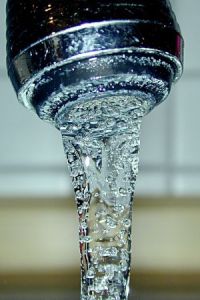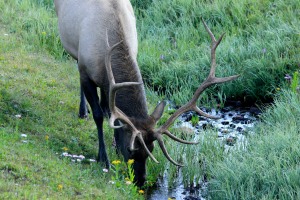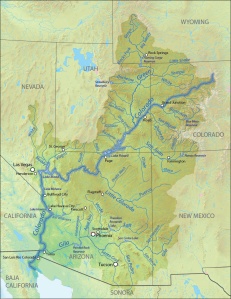Just over three years ago, I started what would become the first of several water courses that I would take while working on my second undergraduate degree in environmental science. It was during that semester that the reality of water’s importance in my life, and everyone else’s, was unexpectedly pushed to the forefront of my mind. Not only would I learn about the fragile relationship between water and humans in the classroom, but a 100-year flood was raging outside of our windows, driving home the importance for balance in the relationship.
Prior to taking this class, I, like many other people, never considered the process that water must go through in order to get to my home in drinkable condition.  I did not think about the origin of my water, or that it is a nonrenewable resource that, in the future, might not be available. I was unaware of the laws that make water accessible to me, as well as the federal laws that make water safe for people, animals and the environment. I took for granted that each time I turned on the faucet, flushed the toilet, or started the washing machine, safe water would pour forth. It never occurred to me to be thankful for Colorado water.
I did not think about the origin of my water, or that it is a nonrenewable resource that, in the future, might not be available. I was unaware of the laws that make water accessible to me, as well as the federal laws that make water safe for people, animals and the environment. I took for granted that each time I turned on the faucet, flushed the toilet, or started the washing machine, safe water would pour forth. It never occurred to me to be thankful for Colorado water.
I’ve since learned about the physical and chemical treatment processes that make water potable, and the delivery systems that pipe that potable water into our homes, schools and places of work every single day, without fail, at a reasonable price, for which I am eternally grateful. Along with this information came the knowledge that not everyone in this world, or even in this country, is as lucky to have access to the quality water and infrastructure that we do in Colorado. Across the world, more than 650 million people in developing countries and 13 million people in developed countries still do not have access to safe water and often, that water costs more than locals can afford (water.org).
For me, this serves as an important reminder to be thankful that I live in Colorado, where more than 99 percent of residents have access to affordable, safe drinking water, as well as improved sanitation facilities. I am so appreciative that when we take a drink from the faucet, we don’t have to worry that we will get sick!

Mohawk Lake
We have infrastructure and water treatment in Colorado that ensures that, no matter how far water has to travel, when it gets to the farthest point of a municipality, that water will STILL be free from dangerous microorganisms and pollution–it is truly astonishing what hard working people and technology are able to accomplish! We are so fortunate to have access to safe, clean, water and this is the perfect time of year to acknowledge our thanks for the role that Colorado’s water plays in our physical and environmental health!
Thankfully, there are also many ways to get involved in protecting and conserving water in Colorado. There are numerous wonderful and dedicated people who are committed to keeping our water resources safe and clean. One such organization is Water for People, whose mission it is to make sure that all people have access to reliable and safe drinking  water and sanitation. Stay posted for an interview with Water for People CEO Eleanor Allen in the upcoming issue of Headwaters magazine! Other organizations that share in the mission to protect one of our most valuable resources include the American Water Works Association and Colorado WaterWise. Countless people care about keeping Colorado water, and water around the world, safe for everyone! I appreciate their tireless work!
water and sanitation. Stay posted for an interview with Water for People CEO Eleanor Allen in the upcoming issue of Headwaters magazine! Other organizations that share in the mission to protect one of our most valuable resources include the American Water Works Association and Colorado WaterWise. Countless people care about keeping Colorado water, and water around the world, safe for everyone! I appreciate their tireless work!
Another reason to be thankful is that Colorado is a headwaters state: home to the majestic Rocky Mountains and four powerful rivers whose waters begin in our state and flow to feed neighboring states, and even other countries—the Colorado River, the Arkansas River, the Rio Grande and the Platte River.

Colorado is home to the headwaters of the Colorado River.
I am thankful that we have access to clean pristine mountain water that can be used over and over again on its travels across the western United States for drinking, agriculture, industry, recreational activities and hydroelectric power generation. Our water supply is limited, and we are privileged to live close to the headwaters, to see where our water originates, and to experience the various ways that water is used before it moves on to support other parts of the country that depend on Colorado water.
Colorado is a natural wonder to behold with its beautiful lakes, rivers, and snow-covered mountains that provide stunning views, as well as outstanding outdoor recreational opportunities that beckon to people

Colorado River Credit: Robert Nunnally
from around the world. Recreation that is dependent on the Colorado River brings 5.36 million adults to the river for these activities, supports 250 million jobs and funnels $26 billion into the economy (coloradoriverbasin.org). The Arkansas Headwaters area is recognized as one of the nation’s most popular locations for whitewater rafting and kayaking, and holds the distinction of being the most commercially rafted river in the entire country.

Arkansas
The Arkansas River is renowned for its amazing fishing opportunities, and the area also provides opportunities for outdoor activities such as camping, hiking and even gold panning (cpw.state.co.us)! Living in or visiting Colorado offers people the chance to take part in all of the amazing activities that water provides for the state.

Fraser River
I now realize how lucky I am to live in Colorado, and I no longer take our water wealth for granted. So today, in the spirit of Thanksgiving, I wish to thank Colorado for its supply of life-giving water that is plentiful, clean, and affordable. I couldn’t live without you!

 Print
Print
Reblogged this on Coyote Gulch.